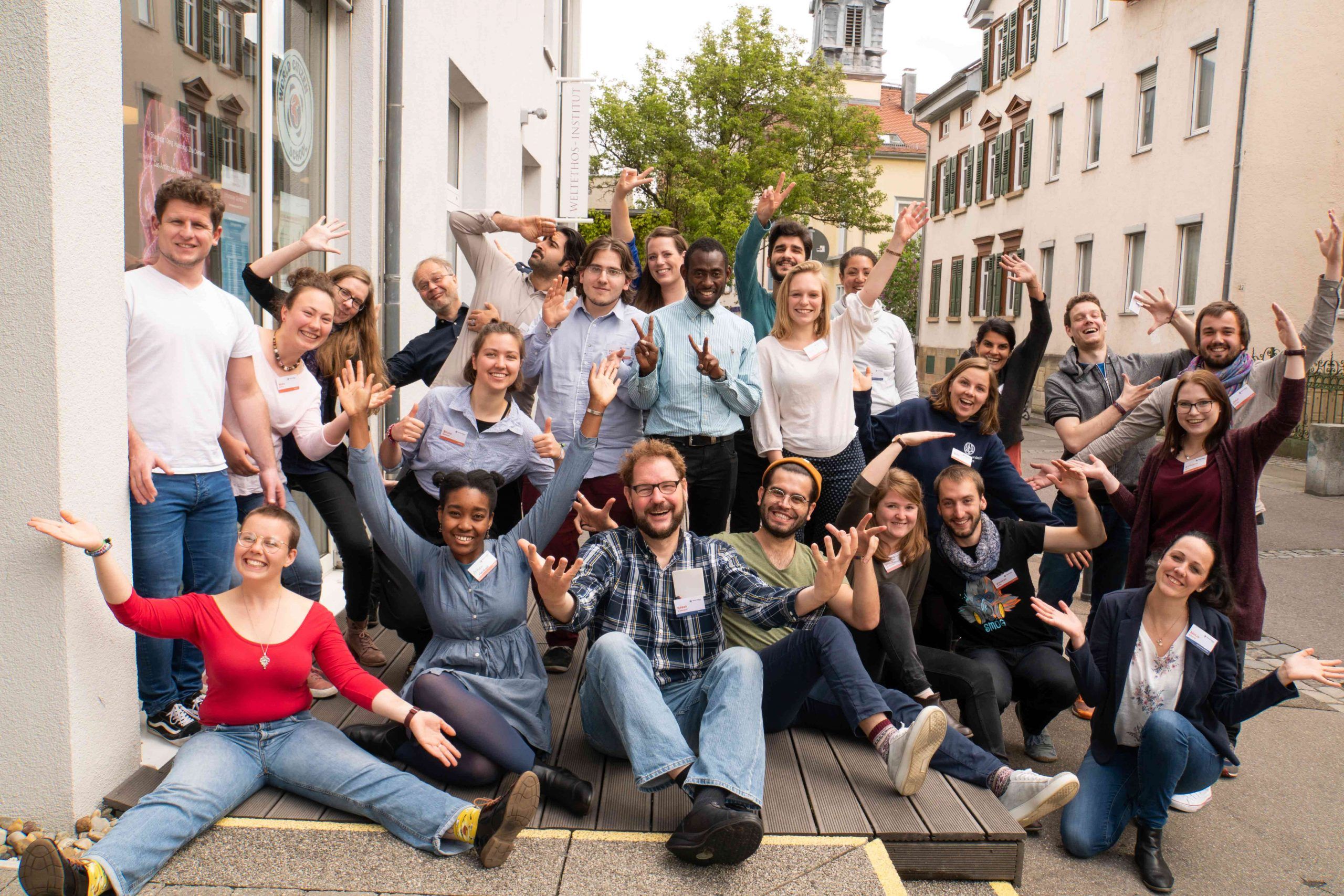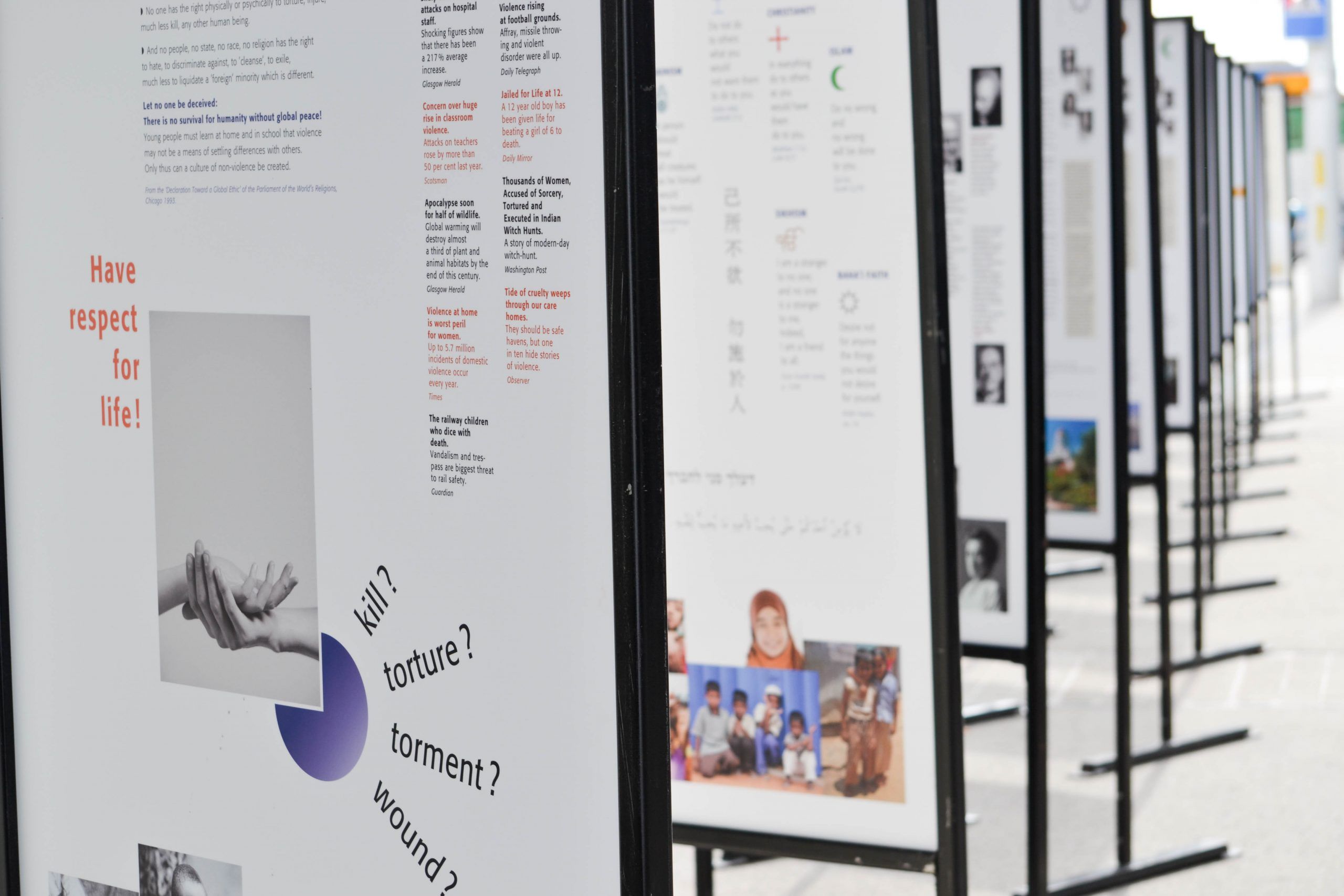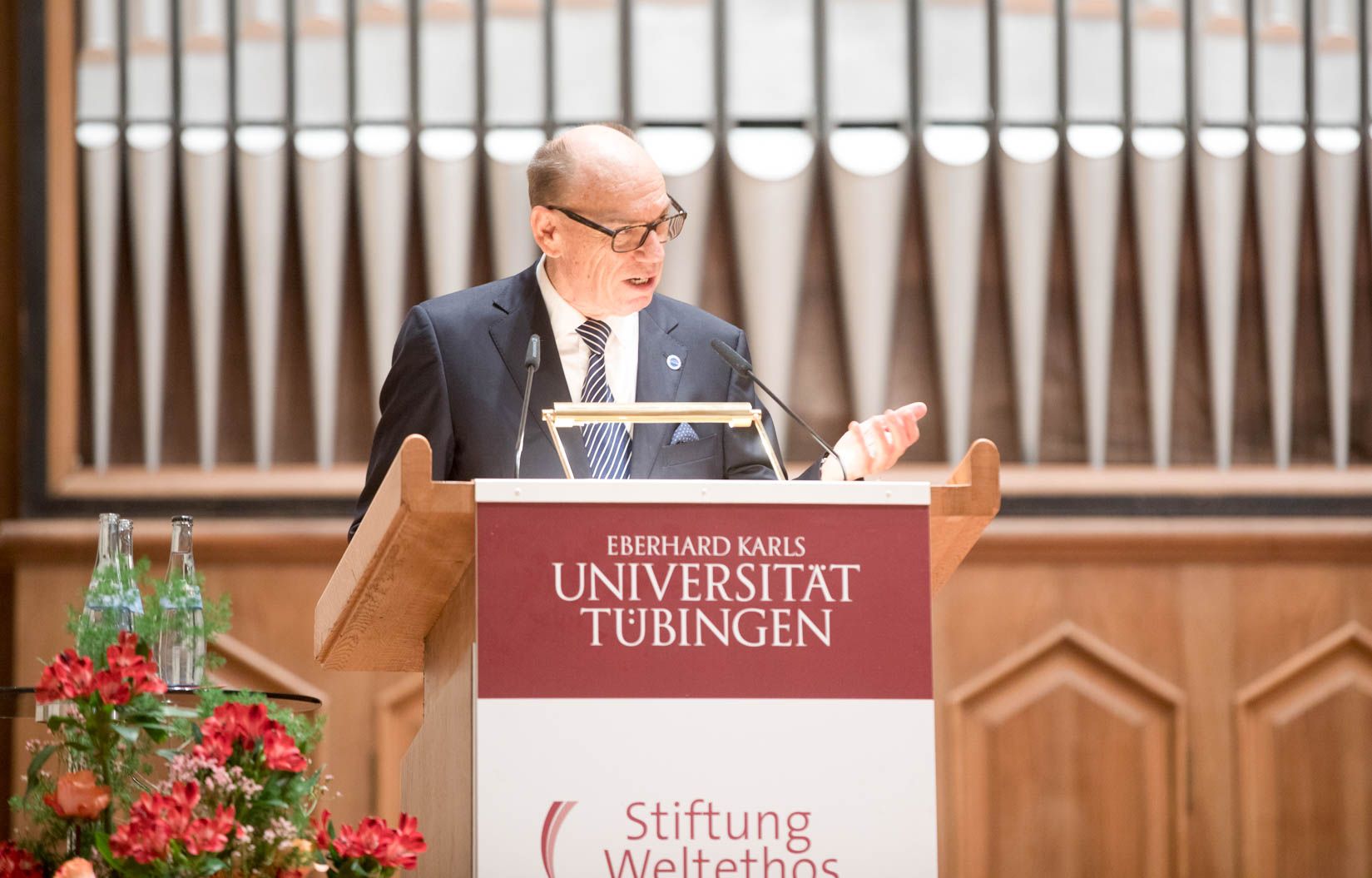weltethos
For a better world we need a common ground. Common values on which we agree. Only then can we enter into constructive dialogue and shape the world together. The good news is that this already exists.
Across all religions, cultures and philosophies, there are principles that recur time and again. One of them is the Golden Rule of Reciprocity, according to which one should behave towards one’s fellow human beings as one would like to be treated oneself.
The other is the demand that all people should be treated humanely. In terms of ethical principles, both belong to the greatest common denominator, which all people worldwide in principle agree to.
In 1990, the internationally renowned theologian Hans Küng derived basic values from the discovery of this greatest common denominator and collectively referred to them as a Weltethos or Global Ethic. They are a common basis for dialogue and sustainable development, both in smaller groups and in relation to the global community.
01 NON-VIOLENCE
Only when fists and guns are silent we can enter into conversation. And we prefer our conversations non-violent as well.
02 JUSTICE
Those who strive for it are not only concerned for their own well-being, but are fair and in solidarity when injustice is done to others.
03 TRUTHFULNESS
Truth and sincere action are fundamental to both our personal development and social progress.
04 EQUALITY & PARTNERSHIP
In this way we all meet at eye level. This excludes any form of discrimination.
05 ECOLOGICAL RESPONSIBILITY
Those who accept it strive to protect our natural resources – for our fellow humans, the environment and posterity.
These values are by no means new. But they provide the basis for peaceful coexistence in diversity. If we consciously live by them, we can remain in dialogue and change the world.
Weltethos
and Figures
1990 Established by Hans Küng
After years of basic research, the internationally renowned theologian Hans Küng publishes his program paper “Projekt Weltethos“. With it he wants to make people newly aware of the basic consensus of already existing commonalities. And this applies to religious and non-religious people worldwide in all areas of life. He is convinced that for peaceful coexistence, people are dependent on such a consensus on ethical norms and standards.
1993 DECLARATION ON A GLOBAL ETHIC
The Parliament of the World Religions adopts a declaration on a global ethic. For the first time, representatives of all world religions agreed on core elements of a common ethos, such as the principle of humanity, the Golden Rule and the four immutable directives: Non-violence, justice, truthfulness, and equality and partnership.
1995 ESTABLISHMENT OF THE FOUNDATION
In order to promote the Global Ethic project, Hans Küng together with count Karl Konrad founded the Global Ethic Foundation in 1995. On the one hand, to create an awareness of fundamental common values in all parts of society, and on the other hand to promote intercultural and interreligious understanding. In this spirit, the Global Ethic Foundation is committed to intercultural and interreligious education and encounters through various projects.
2009 PRESENTATION TO THE UNITED NATIONS: A GLOBAL BUSINESS ETHIC
The crises and scandals in the world of business and finance show more and more clearly that the global economy needs an ethical framework. Hans Küng emphasized this already in 1990 at the World Economic Forum in Davos. Together with business ethicists* and entrepreneurs*, the foundation is working on the “Manifesto Global Business Ethics”, which was presented at the UN headquarters in New York and has since been signed by a considerable number of well-known personalities from business, politics, science and religion.
2012 FOUNDATION OF THE INSTITUTE
The Weltethos Institute is a research and teaching institution at the University of Tübingen with the goal of promoting value orientation and trust in business and society. To this end, it regularly offers seminars for students and learning programs of dialogue for people in organizations and companies. It was founded 2012 by the Stiftung Weltethos, the University of Tübingen and the Karl Schlecht Stiftung.
STAFF AND VOLUNTEERS
With all of our employees and volunteers, we are currently 77 people who are carrying the Weltethos project into the world.
PUPILS
Through our Weltethos Schools and the worldlab we have already reached over 14,000 students. They learn to reflect on values, to live diversity and thus help to shape democracy at an early age.
STUDENTS
The Weltethos at the University of Tübingen has already offered more than 1600 students room for shared learning in seminars and lectures. The focus is on practical questions of self- and global responsibility in the field of business and society.
FOUNDATIONS AND INITIATIVES
In addition to the Weltethos Foundation (Global Ethic Foundation), other foundations also promote the Weltethos idea, for example in Switzerland and in Austria. In addition, there are the many initiatives of the World Citizen School, each of which is committed in its own way to community, diversity and a good future.
GLOBAL ETHIC AMBASSADORS
Since 2019, the Weltethos Institute offers the Weltethos Ambassador Program twice a year for leaders and managers. Since the beginning of the program, 38 Ambassadors have been committed to values, dialogue and trust in business.
and Figures
1990 Established by Hans Küng
After years of basic research, the internationally renowned theologian Hans Küng publishes his program paper “Projekt Weltethos“. With it he wants to make people newly aware of the basic consensus of already existing commonalities. And this applies to religious and non-religious people worldwide in all areas of life. He is convinced that for peaceful coexistence, people are dependent on such a consensus on ethical norms and standards.
STAFF AND VOLUNTEERS
With all of our employees and volunteers, we are currently 77 people who are carrying the Weltethos project into the world.
1993 Declaration on a Global Ethic
The Parliament of the World Religions adopts a declaration on a global ethic. For the first time, representatives of all world religions agreed on core elements of a common ethos, such as the principle of humanity, the Golden Rule and the four immutable directives: Non-violence, justice, truthfulness, and equality and partnership.
PUPILS
Through our Weltethos Schools and the worldlab we have already reached over 14,000 students. They learn to reflect on values, to live diversity and thus help to shape democracy at an early age.
1995 Establishment of the foundation
In order to promote the Global Ethic project, Hans Küng together with count Karl Konrad founded the Global Ethic Foundation in 1995. On the one hand, to create an awareness of fundamental common values in all parts of society, and on the other hand to promote intercultural and interreligious understanding. In this spirit, the Global Ethic Foundation is committed to intercultural and interreligious education and encounters through various projects.
STUDENTS
The Weltethos at the University of Tübingen has already offered more than 1600 students room for shared learning in seminars and lectures. The focus is on practical questions of self- and global responsibility in the field of business and society.
2009 Presentation to the United Nations: A Global Business Ethic
The crises and scandals in the world of business and finance show more and more clearly that the global economy needs an ethical framework. Hans Küng emphasized this already in 1990 at the World Economic Forum in Davos. Together with business ethicists* and entrepreneurs*, the foundation is working on the “Manifesto Global Business Ethics”, which was presented at the UN headquarters in New York and has since been signed by a considerable number of well-known personalities from business, politics, science and religion.
FOUNDATIONS AND INITIATIVES
In addition to the Weltethos Foundation (Global Ethic Foundation), other foundations also promote the Weltethos idea, for example in Switzerland and in Austria. In addition, there are the many initiatives of the World Citizen School, each of which is committed in its own way to community, diversity and a good future.
2012 Foundation of the Institute
The Weltethos Institute is a research and teaching institution at the University of Tübingen with the goal of promoting value orientation and trust in business and society. To this end, it regularly offers seminars for students and learning programs of dialogue for people in organizations and companies. It was founded 2012 by the Stiftung Weltethos, the University of Tübingen and the Karl Schlecht Stiftung.
GLOBAL ETHIC AMBASSADORS
Since 2019, the Weltethos Institute offers the Weltethos Ambassador Program twice a year for leaders and managers. Since the beginning of the program, 38 Ambassadors have been committed to values, dialogue and trust in business.
Supporters & Partners


















Dr. Nicola Leibinger-Kammüller

Carla Schwöbel-Braun










